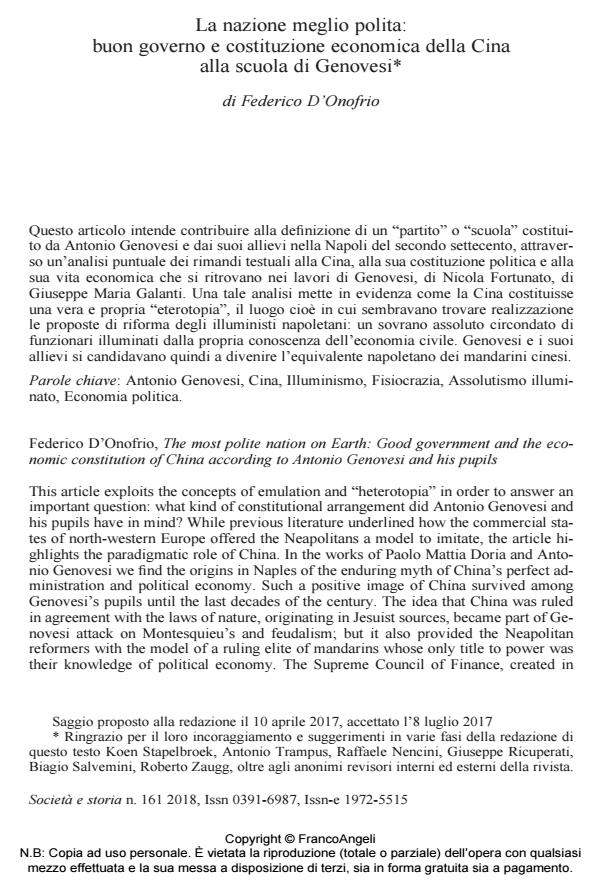La nazione meglio polita: buon governo e costituzione economica della Cina alla scuola di Genovesi
Titolo Rivista SOCIETÀ E STORIA
Autori/Curatori Federico D’Onofrio
Anno di pubblicazione 2018 Fascicolo 2018/161
Lingua Italiano Numero pagine 27 P. 471-497 Dimensione file 96 KB
DOI 10.3280/SS2018-161002
Il DOI è il codice a barre della proprietà intellettuale: per saperne di più
clicca qui
Qui sotto puoi vedere in anteprima la prima pagina di questo articolo.
Se questo articolo ti interessa, lo puoi acquistare (e scaricare in formato pdf) seguendo le facili indicazioni per acquistare il download credit. Acquista Download Credits per scaricare questo Articolo in formato PDF

FrancoAngeli è membro della Publishers International Linking Association, Inc (PILA)associazione indipendente e non profit per facilitare (attraverso i servizi tecnologici implementati da CrossRef.org) l’accesso degli studiosi ai contenuti digitali nelle pubblicazioni professionali e scientifiche
Questo articolo intende contribuire alla definizione di un "partito" o "scuola" costituito da Antonio Genovesi e dai suoi allievi nella Napoli del secondo settecento, attraverso un’analisi puntuale dei rimandi testuali alla Cina, alla sua costituzione politica e alla sua vita economica che si ritrovano nei lavori di Genovesi, di Nicola Fortunato, di Giuseppe Maria Galanti. Una tale analisi mette in evidenza come la Cina costituisse una vera e propria "eterotopia", il luogo cioè in cui sembravano trovare realizzazione le proposte di riforma degli illuministi napoletani: un sovrano assoluto circondato di funzionari illuminati dalla propria conoscenza dell’economia civile. Genovesi e i suoi allievi si candidavano quindi a divenire l’equivalente napoletano dei mandarini cinesi.
Parole chiave:Antonio Genovesi, Cina, Illuminismo, Fisiocrazia, Assolutismo illuminato, Economia politica.
- Quale storia della società? Uno sguardo sull'epoca moderna Paola Bianchi, in SOCIETÀ E STORIA 178/2023 pp.711
DOI: 10.3280/SS2022-178005
Federico D’Onofrio, La nazione meglio polita: buon governo e costituzione economica della Cina alla scuola di Genovesi in "SOCIETÀ E STORIA " 161/2018, pp 471-497, DOI: 10.3280/SS2018-161002